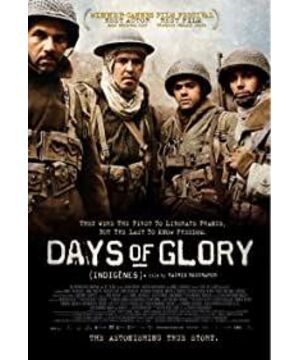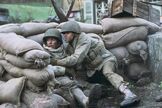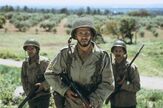"Glorious Years" is a rare war film. In 2007, it won the Best Actor Award at the Cannes Film Festival and many other awards. For such a good movie, these external awards are just the icing on the cake. The French title of the film is Indigenes, which means indigenous, referring to the natives in the colony relative to the foreign colonists, excluding native whites. The English translation is Days of glory, and the Chinese translation is "glorious years" according to English, which is also an appropriate translation.
The plot of the movie is not complicated. It tells that during World War II, North Africans who were colonized by North Africa were drafted into the army during World War II and fought for the integrity, independence and freedom of their mother country, France, so they went to Italy and France one after another to join the German army. , and won several victories in succession. However, when they claimed to be French and fought side by side with the native French, they were discriminated and unfairly treated by French officers. For example, French people eat better than Africans; French people have more vacation opportunities and promotion opportunities. One of the typical events is a large group of French soldiers on a troop carrier, ready to go to the south of France. But on the ship, a mutiny almost happened. While queuing for dinner, a black African soldier saw that the white soldier in front of him had tomatoes, so he also asked to eat tomatoes, but the chef refused to give them, saying that only the French had them. So, the North Africans, the blacks, were all angry and almost rioted. Fortunately, their superior officers ordered the cooks to treat everyone equally, and everyone could eat tomatoes, and the incident was quelled. Just as the incident had just subsided, the announcer on the ship came to the news that they had seen the French mainland, and everyone could board the land of France immediately and take the lead in singing the "Marseilles". All of a sudden, everyone was full of excitement. With deep affection, he began to sing "Marseilles". Whether white or black, or North Africans of any color in between, they are all united as one through the Marseillaise.
After arriving in mainland France, the North African Legion continued to fight heroically. At this time, they felt more and more strongly that they were being treated unfairly. Therefore, some people began to want to go home because of homesickness. At this moment, they were given the task of holding on to a remote but strategically important village in the mountains of northeastern France. So, despite their dissatisfaction, they still accepted the mission as soldiers. Due to the accidental landmine on the road, only four and one wounded soldier finally arrived at the mission site. But they still did an excellent job, fending off German attacks and holding out until the arrival of a large French army. Of course, they also paid a heavy price: only one person survived...
In the official history of France, as well as in the history of World War II, the contribution of the North African Army in World War II has been rarely mentioned. This film can be said to reveal a little-known side of history. There are no twists and turns, and there are no grand scenes, but from the beginning to the end, I am still in a surging mood, and it is difficult to calm down for a long time.
This film is multi-protagonist, and does not particularly highlight one person, but concentrates on portraying the images of several people. These people are just ordinary people who became warriors, fighting heroes, and liberators of France because of special circumstances. They have many flaws and are not perfect. For example, a certain North African soldier, after winning a battle and entering a certain city, once wanted to enter a church to steal. Because they were originally just some mountain people, Arabs, Muslims, and enslaved people in the colonies. However, today they are fighting for the homeland of the colonizers, and they are full of the belief that France is also their France, and they fought faithfully and bravely for the independence and freedom of France. However, the French do not think they are French, do not think this is their France. As a result, Africans understand what inequality is: promotion opportunities, vacation opportunities, treatment, etc. In short, good things always favor the French first. However, they are soldiers, and even if they were treated unfairly, they still carried out their combat missions unswervingly until they died in battle.
The honor belongs to them, but it is buried by the dust of history. If it wasn't for the director's discerning eye, would no one remember them, or would they be forgotten by future generations?
However, what is honor? If history forgets them, do they lose their honor? Did they sacrifice in vain? That is, does honor really depend on the recognition of others? Or is it the recognition and affirmation of the country, history, and future generations, or the praise and envy of those who are contemporaries? But the question is, what if others don't admit it? If others don't admit it, it seems awkward to talk about honor at this time. This is where the film is so profound, it shows the paradox that when soldiers think they are fighting for their homeland, the homeland (France, the French) doesn't really recognize and accept them. How to do? They were not really one of the French mothers. Do they still have to fight for such a homeland? In the movie, the characters in the play chose to obey the soldier's duty and still insist on fighting for the country. This shows once again the noble qualities of soldiers, important members of any political community, who sacrificed their individual liberties and lives to maintain the integrity and security of the community, and sacrificed their ego to achieve their larger self, It's really hilarious. Everyone is free and has their own family, but the soldiers gave up their freedom and chose to obey. They left their homes, left their warm families and entered a well-ordered and hierarchical army. Why do they do this? Although some people enlist for personal reasons, once a member of the army, as a soldier, he acquires value beyond the ego, and the honor of a soldier lies in the honor of being the defender of the community. Therefore, for a real soldier, fighting bravely is his virtue and honor. Whether he is recognized by others or remembered by history is not the most important issue.
So far, I can't stop looking for the old song "Blood-stained Demeanor", which was quite popular in the 1980s, and listened to it several times with tears in my eyes.
View more about Days of Glory reviews











